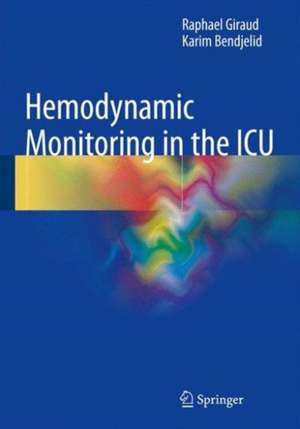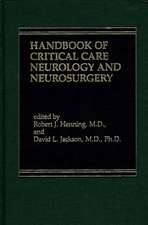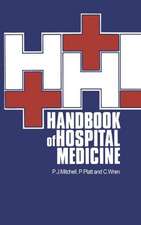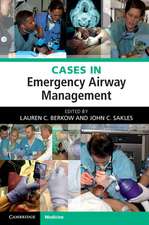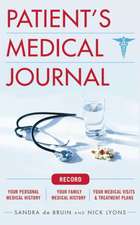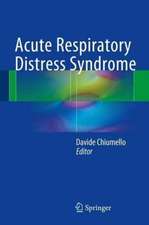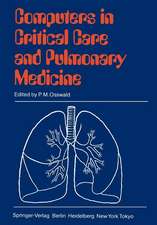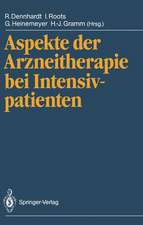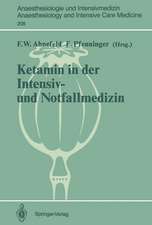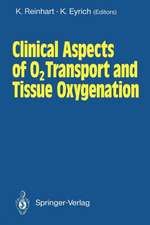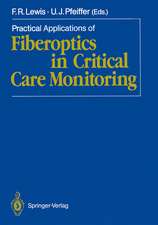Hemodynamic Monitoring in the ICU
Autor Raphael Giraud, Karim Bendjeliden Limba Engleză Hardback – 13 mai 2016
| Toate formatele și edițiile | Preț | Express |
|---|---|---|
| Paperback (1) | 595.21 lei 38-44 zile | |
| Springer International Publishing – 27 mai 2018 | 595.21 lei 38-44 zile | |
| Hardback (1) | 597.73 lei 38-44 zile | |
| Springer International Publishing – 13 mai 2016 | 597.73 lei 38-44 zile |
Preț: 597.73 lei
Preț vechi: 629.19 lei
-5% Nou
Puncte Express: 897
Preț estimativ în valută:
114.41€ • 124.32$ • 96.17£
114.41€ • 124.32$ • 96.17£
Carte tipărită la comandă
Livrare economică 17-23 aprilie
Preluare comenzi: 021 569.72.76
Specificații
ISBN-13: 9783319294292
ISBN-10: 3319294296
Pagini: 95
Ilustrații: XVIII, 95 p. 55 illus., 54 illus. in color.
Dimensiuni: 178 x 254 x 11 mm
Greutate: 0.55 kg
Ediția:1st ed. 2016
Editura: Springer International Publishing
Colecția Springer
Locul publicării:Cham, Switzerland
ISBN-10: 3319294296
Pagini: 95
Ilustrații: XVIII, 95 p. 55 illus., 54 illus. in color.
Dimensiuni: 178 x 254 x 11 mm
Greutate: 0.55 kg
Ediția:1st ed. 2016
Editura: Springer International Publishing
Colecția Springer
Locul publicării:Cham, Switzerland
Cuprins
Recenzii
“This is a brief monograph that provides an excellent overview of the multitude of available cardiovascular and metabolic monitors. … Trainees in critical care and staff at all levels are an appropriate audience for this book. … Chapters are clearly written with excellent line drawings highlighting physiological principles. … This book is recommended for its concise presentation of essential physiology and broad review of current and historic monitoring techniques.” (David J. Dries, Doody's Book Reviews, September, 2016)
Notă biografică
Karim Bendjelid, MD, MSc, and PhD, is a cardiologist/intensivist attending physician at the Geneva University Hospitals (Intensive Care Service) and a Senior Lecturer at Geneva Medical University. Dr. Bendjelid obtained his MSc in Cardiovascular Pharmacology at the Pierre and Marie Curie University (University of Paris VI) (France) and his PhD in Physiology at University of Claude Bernard, Lyon I (France). His main research interests concern hemodynamic monitoring (macrocirculation/microcirculation) and Cardiovascular Physiology. In these fields, he has authored or co-authored over 120 scientific papers published in peer-reviewed journals and books. He has been a chairman or keynote lecturer at a number of international conferences organized by different prestigious societies. He is a regular member of the European Society of Cardiology, the American Physiological Society, and the Swiss Society of Intensive Care Medicine.
Raphaël Giraud, MD, MSc and PhD is an anesthesiologist/intensivist attending physician at the Geneva University Hospitals (Intensive Care Service) and a Senior Lecturer at Geneva Medical University. Dr. Giraud obtained his MSc in Cardiovascular Pharmacology at University of Claude Bernard, Lyon I (France) and his PhD in Physiology at University of Claude Bernard, Lyon I (France). His main research interests concern hemodynamic monitoring (macrocirculation) and Cardiovascular Physiology. In these fields, he has authored or co-authored over 30 scientific papers published in peer-reviewed journals and books. He is a regular member of the Swiss Society of Intensive Care Medicine.
Raphaël Giraud, MD, MSc and PhD is an anesthesiologist/intensivist attending physician at the Geneva University Hospitals (Intensive Care Service) and a Senior Lecturer at Geneva Medical University. Dr. Giraud obtained his MSc in Cardiovascular Pharmacology at University of Claude Bernard, Lyon I (France) and his PhD in Physiology at University of Claude Bernard, Lyon I (France). His main research interests concern hemodynamic monitoring (macrocirculation) and Cardiovascular Physiology. In these fields, he has authored or co-authored over 30 scientific papers published in peer-reviewed journals and books. He is a regular member of the Swiss Society of Intensive Care Medicine.
Textul de pe ultima copertă
This book describes the pathophysiological significance of the hemodynamic monitoring parameters available to the clinician and their role in providing reliable and reproducible information on the cardiocirculatory status of a patient in shock. It is explained how measurements of these parameters enable the intensivist to understand the patient’s condition and to make more informed treatment decisions in order to optimize the hemodynamic status and improve the prognosis. Full guidance is provided on measurement of intravascular blood pressures, cardiac output, and derived variables. Methods of cardiac output determination based on the classical pulmonary thermodilution, transpulmonary thermodilution, echocardiography, and Doppler techniques are reviewed. Techniques based on calibrated and non-calibrated pulse contour analysis are discussed, with attention to their limitations. Furthermore, the dynamic indices of fluid responsiveness, their clinical applications, and issues related to their use are addressed. Care is also taken to explain the physiological concepts underlying various devices used by anesthesiologists and intensivists.
Caracteristici
Explains the pathophysiological significance of hemodynamic monitoring parameters Aids treatment decision-making Written by well-known experts in the field
